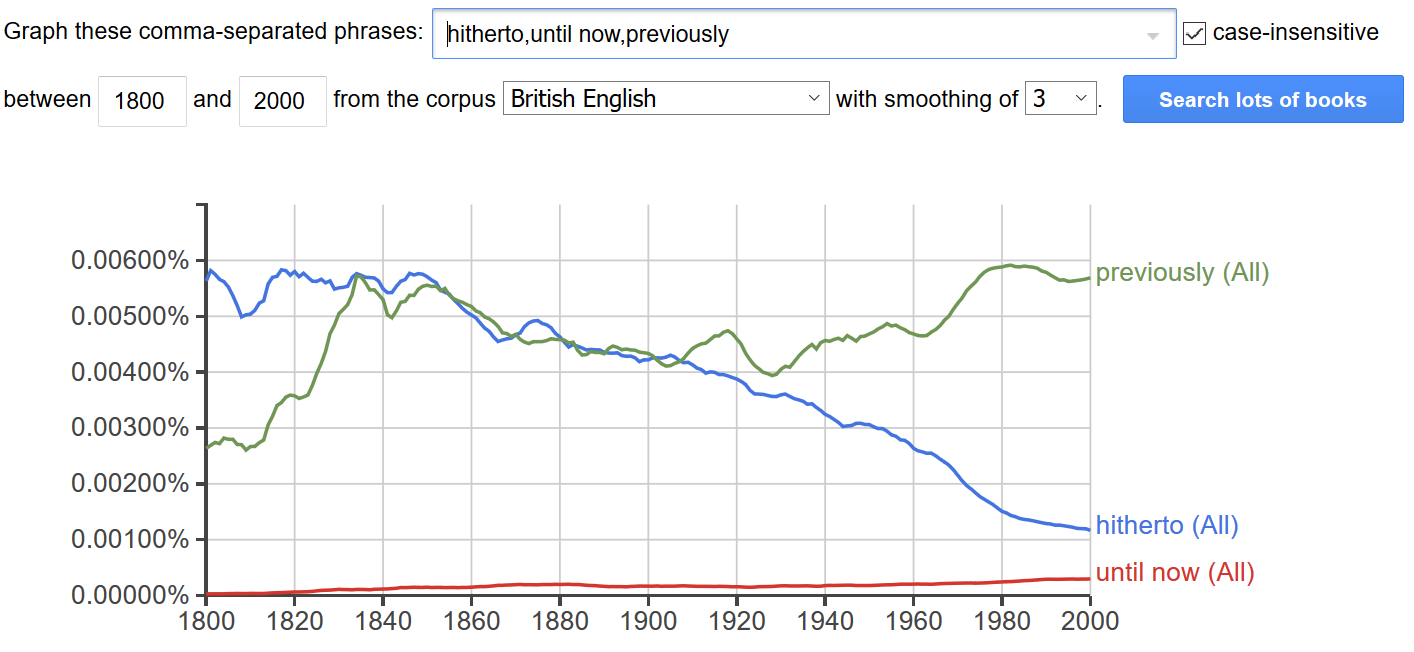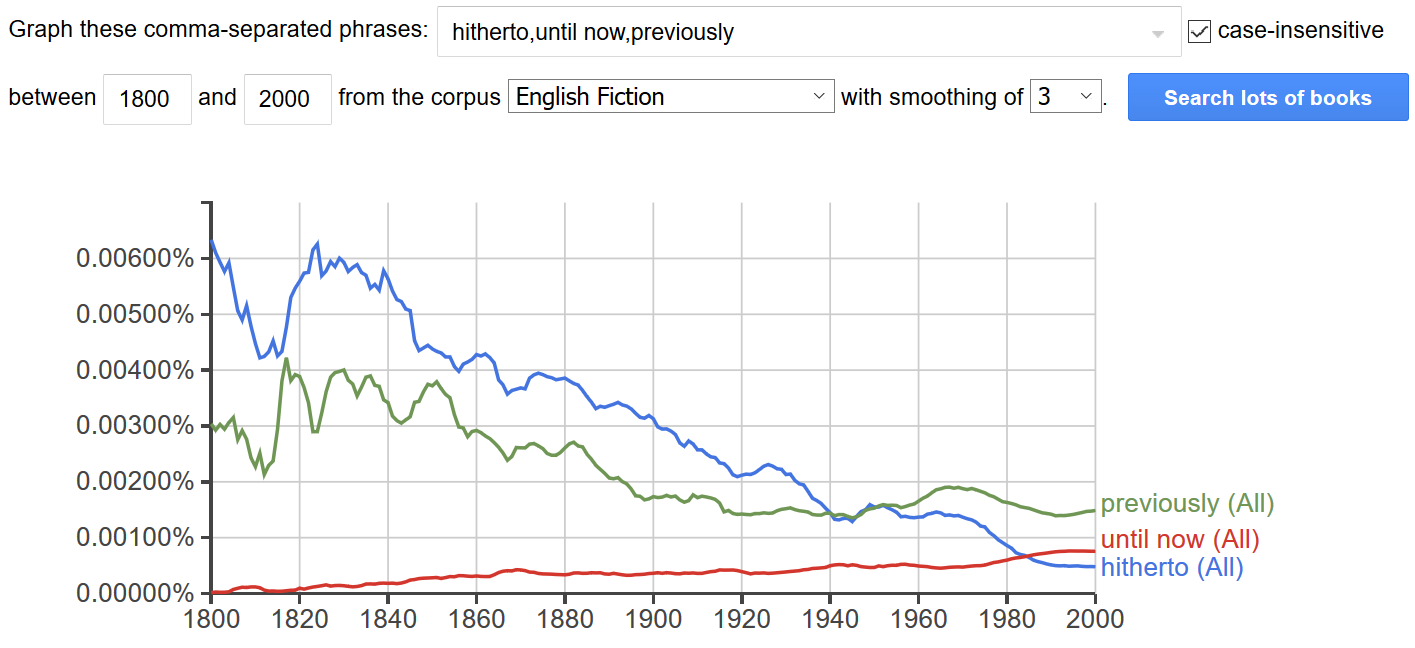I am wondering if you would consider the word hitherto to be outdated. I prefer it over its definition, "until now" and know of no equal alternative. I have been marked down (on papers) for using this "archaic" word. So, is this word outdated? If so, what is a good alternative?
8 Answers
Merriam-Webster Unabridged does not flag hitherto as "archaic."
Macmillan does mark hitherto as "very formal" but it's by no means outdated.
Whoever marked you down for using an "archaic" word is wrong (unless perhaps you were using hitherto in an informal context).
(Disclaimer: I read enough fantasy literature that hitherto seems rather ordinary to me.)
-
Comments are not for extended discussion; this conversation has been moved to chat.– tchrist ♦Commented Apr 14, 2018 at 0:46
Anecdotally, yes, I would consider it archaic, and if I heard you use it I'd either think you were being pretentious, or that you were deliberately joking about speaking in a pretentious manner.
For reference, I'm a college educated American in my 40s.
As for replacements, I would just use "up to now" or "up till now". "yet" also works in some contexts.
Edit: To further emphasize, despite my education and reasonably broad reading habits, I'm not sure that I could have correctly defined "hitherto" until encountering this question, so this is about more than just trying to avoid seeming old-fashioned. I think using this term outside of certain technical contexts means you will not be widely understood by a general audience.
-
1
-
2I agree. I'm a college educated Brit in my very late 50's. (I only get to use that line for another week.) Commented Apr 11, 2018 at 12:33
-
5pretentious ≠ archaic. And "excessively formal" / "unlikely to be understood" are not the same as "archaic" either. Commented Apr 11, 2018 at 21:45
-
1@ShreevatsaR True, but pedantic. I'm answering OP's underlying question "should I refrain from using this word", and judging by the votes, others agree with me.– BradCCommented Apr 11, 2018 at 21:57
-
5I'd say hitherto would appear pretentious in a speech in a colloquial context but written in an academic text, as in school, it's ordinary. Also, not wanting to be rude, if one doesn't know the definition of such a word - assuming a native English speaking adult - then I'd question if your education is as good as you imagine it to be. You're safe if you're not writing for children or tabloid press IMO.– pbhjCommented Apr 12, 2018 at 21:18
Though I agree with Gnawme's conclusion, I thought I'd check the Google Ngram viewer to see how "hitherto" compares with "until now" in terms of frequency of usage among their corpus of books in English over the years. The chart shows that the frequency of usage of "hitherto" fell fairly uniformly by 80-90% over the years from 1800 to 2000, with a slight upturn from 2000 to 2008.
-
5The Google Books Ngram Viewer data sets from before 2000 and after 2000 are not directly comparable, so it is very common to find changes in trends in the corpus in the year 2000, but these may not always reflect actual changes in trends in real usage. That's why the default window is set from 1800 to 2000, the most carefully curated portion of the corpus. Please be careful what conclusions you draw if you decide to make charts from 1800 to 2008 with their tool.– user28567Commented Apr 11, 2018 at 1:16
-
Thanks for the tip. Where is that documented? It certainly makes sense--I'd been wondering why they'd never updated the default, and I keep replacing it with 2008 because I thought it was desirable to have their most recent inclusions! Alas, they don't have any data after 2008. Commented Apr 11, 2018 at 1:21
-
4Please see the Supporting Online Material for Quantitative Analysis of Culture Using Millions of Digitized Books (2010).– user28567Commented Apr 11, 2018 at 1:24
-
1
-
1@Evargalo I'm surprised by the low occurence of "until now", though Yes! My thoughts exactly. This does not make sense. That hitherto is more popular today than "until now". The mind boggles. Commented Apr 11, 2018 at 19:45
Anecdotally, I read/hear the phrase "hitherto unknown" outside of legal or other technical contexts. I wouldn't say it's archaic, but it's not common. You could avoid it in favor of "previous(ly)" when speaking to a large or less-educated audience, but I don't see any reason to drop it from your vocabulary.
To expand on Green Grasso Holm's answer, here are some Ngrams comparing "hitherto", "until now", and "previously". It looks like "hitherto" is relatively more popular in British English, fiction, and phrases.
-
1"prior to" appears to be more common than "until now" - books.google.com/ngrams/…– omikesCommented Apr 11, 2018 at 23:44
-
1"Prior to" doesn't mean the same thing, though. "Prior to now" is less common: books.google.com/ngrams/… Commented Apr 12, 2018 at 16:50
-
Hitherto and previously do not have to refer to now though. Setting that reference point is what brings the occurrences down I believe.– omikesCommented Apr 12, 2018 at 16:54
Extremely formal usage. Many of the answers you received speak to the fact that 60%, 70%, 80%, 90% of the respondents have never heard it used (in spoken language) or have rarely (if ever) seen it used in written form.
Why use a word...when it's probable that 90% of your audience is totally unfamiliar with that word?
Everyone clearly understands what "until now" means.
-
Why use a word...when it's probable that 90% of your audience is totally unfamiliar with that word? Maybe because it makes them look smarter? Commented Apr 12, 2018 at 13:39
-
2Why use a word... Here are some legitimate reasons. 1. Because it naturally reflects one's thinking process; 2. Because it is easier to say or sounds better in the sentence; 3. Because words with essentially the same meaning still vary in nuance and connotation; 4. Because it is extremely easy to find definitions of words these days and broad vocabulary is generally good for intellectual discussion; 5. To maintain a consistent tone. (Not that I advocate for using esoteric words. It depends on your aims and audience.)– ArteliusCommented Apr 13, 2018 at 7:03
-
1I think it's actually rather unlikely that 90% of the audience is unfamiliar with the word hitherto.– user28567Commented Apr 13, 2018 at 16:07
-
Technically those are 5 "valid reasons". Realistically...if you use the word "hitherto" in a conversation...you would confuse the vast majority of people (regardless of the place/audience). Anyone who was not confused would probably consider the usage "pretentious" (at best). Commented Apr 13, 2018 at 16:12
I would tolerate hitherto, but I would consider the other words from this "set", whitherto and thitherto, to be archaic. Similarly, therefore is fine, but wherefore and especially herefore can sound a bit outdated, though I think they sometimes make more sense in places we use therefore. Just please use therefor correctly.
-
2I think wherefore requires at least 10 minutes of lecture time to explain in every high school class that reads Romeo and Juliet. That's a good sign it's archaic. Commented Apr 12, 2018 at 16:53
-
Personally, I love thitherto (though I don’t believe I’ve ever used whitherto). Conversely, I firmly hold that the only correct way to use therefor is never, even more so with wherefor and (eurgh!) herefor. @ThePhoton It’s a sad state of affairs if it takes a full ten minutes to explain to high school–aged people that wherefore means why. Commented Apr 14, 2018 at 8:49
It is, as Gnawme stated, entirely variable upon the environment in which the word is used or even if it manifests in discourse or written language. For legalese, the Law Dictionary defines hitherto as a 'restrict[ion] [of] the matter in connection with which it is employed to a period of time already passed.'
Therefore, although growing obsolescent in every-day language - Green Grasso presented an 80%-90% decrease between the 1800s and 2000 - it is nevertheless a plenteous lexeme in formal texts!
A similar set of adverbs, 'thereto' and the bygone phrase 'thereunto' might have undertaken a similar trajectory as hitherto, deemed literary or archaic words. This could be extrapolated to hitherto in the future.
'Hitherto' is somewhat archaic, but still used, if largely just in legal writing. It can mean 'up to now', or 'up to a specified time in the past' - i.e. 'up to then'. If the archaic flavour upsets your professor use 'up to now' or 'up to then'. We should always be aware of how what we write will be received by our audience!





